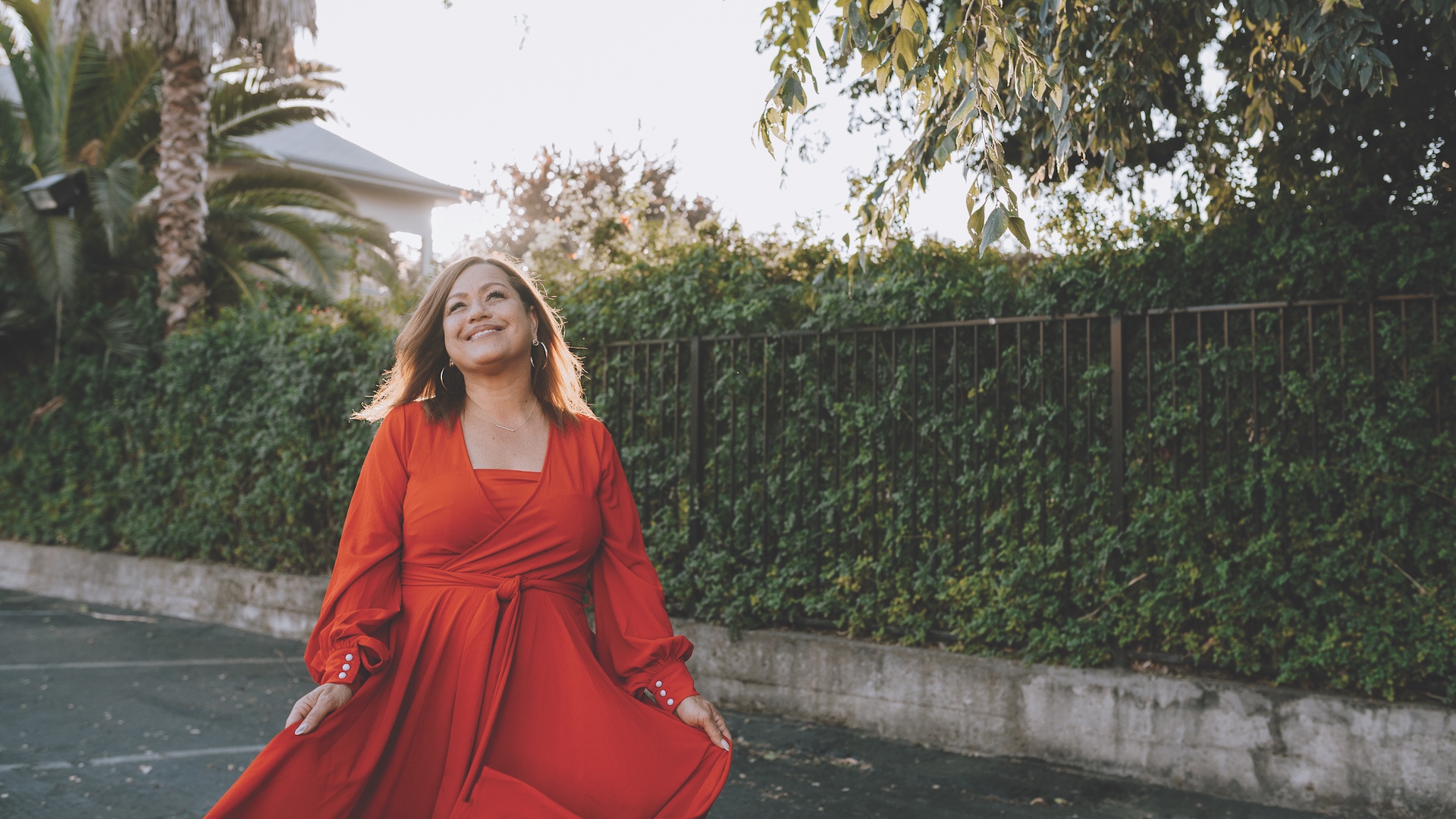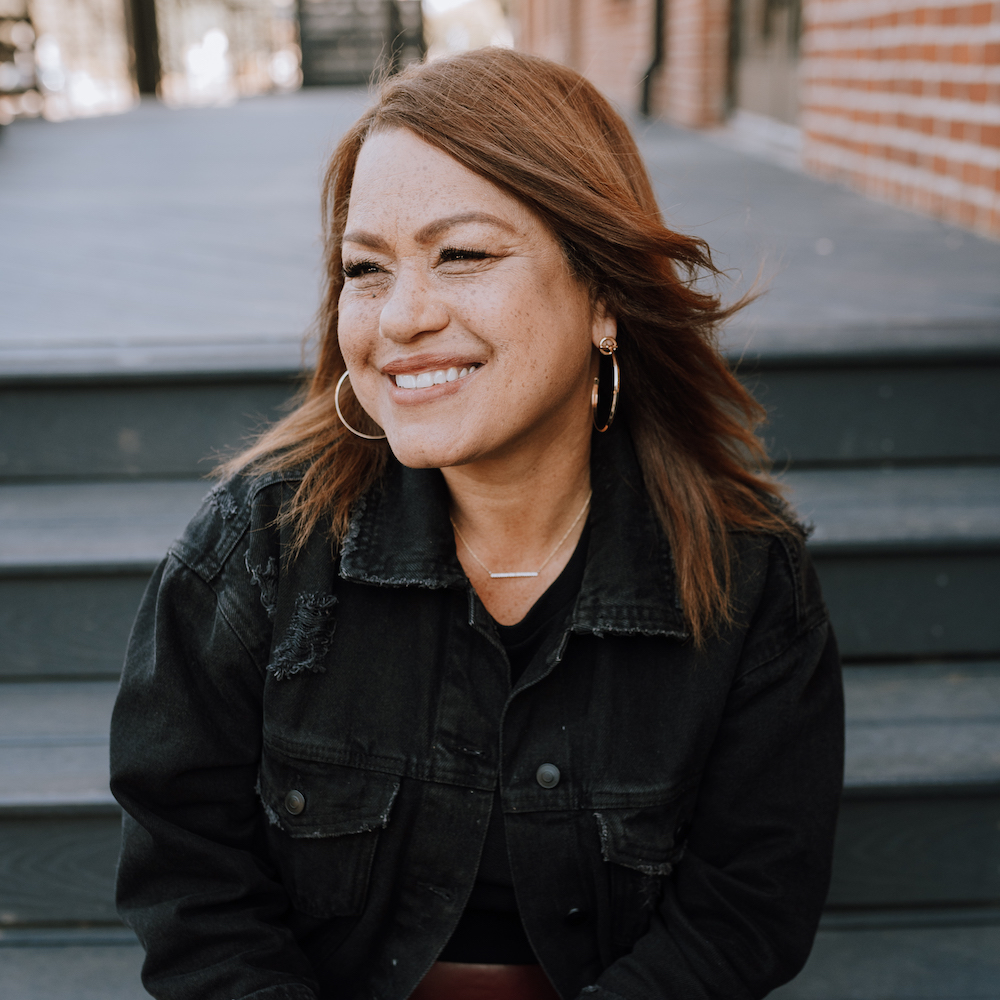How God Took My Messy Life and Called It Holy
The TV studio lights shone bright and hot from all angles on my mother and me, along with the lineup of other women seated with us on the stage. An enormous camera zoomed in as Phil Donahue deftly sidled up to the audience, microphone in hand.
“I’d like to introduce our first guests,” he crooned in his familiar fatherly tone. “Diane and her daughter.” Lifting a presentational hand in my direction, he beamed at the audience. “Isn’t she gorgeous?”
While they nodded and cooed in agreement, I shifted uneasily in my seat.
“Diane.” Serious now, Mr. Donahue addressed my mother. “This is your daughter, Christa, whose father…” He paused, presumably to add to the impact of what he was about to reveal. “…is a Catholic priest.”
Instantly, the audience smiles turned to open-mouthed stares. This was not something people talked about in 1986 and certainly not on daytime television.
It seemed clear that some of the audience members were angry at us. Their tight-lipped expressions said it all. Perhaps they were thinking, This woman has no business desecrating the Holy Church with these lies. What kind of person would have sex with her priest? A priest fathering a baby? Scandalous!
Eventually, the camera returned to Mr. Donahue, who was already prompting Mama for more, ramping up the shock value at every turn. “So, this man is white?”
I was crying now. If only I could disappear!
Mr. Donahue followed the audience’s focus, turning my way. I slouched lower in my seat, wishing it would end. I’d spent my entire 19 years of life burying these painful secrets.
I was born in 1967, on the heels of the civil rights movement. That same year, the Supreme Court of the United States, handed down an unprecedented decision, in the case of Loving v. Virginia, ruling that laws prohibiting interracial marriage were unconstitutional.
Not only was it a dark time for those who found themselves on the opposite end of equity and justice in the nation, but it was also a dark time for women who found themselves pregnant and unwed. Unmarried mothers were often rejected by their communities, their families, and even the very institution that should have provided unwavering support and protection for them—the church. In the 1960s, children who were born out of wedlock were often ostracized by society. These “illegitimate” children, as they were called, were frequently excluded and shamed, further amplifying their marginalization.
My arrival into the world was shrouded in secrecy. I was the product of something illicit and forbidden—a relationship between a priest and his young African American student. In an attempt to cover up his sin, my father convinced my mother to give me up for adoption. When she could no longer conceal her pregnancy, she was shipped off to a home for unwed mothers. While the term “home” typically evokes feelings of comfort and safety, those maternity homes were far from inviting and hospitable. In a 2018 Washington Post article, “The Maternity Homes Where ‘Mind Control’ Was Used on Teen Moms to Give Up Their Babies,” two former teen mothers described those homes as “shame-filled prisons” in their gut-wrenching account of being hidden away from society. But those maternity homes of the ’50s and ’60s mostly served pregnant teens who came from white middle-class families. Because the homes were often segregated, fewer options existed for African American women.
In recent years, my mother has begun to open up to me about the horrors she experienced in that Los Angeles maternity home. It was just a few miles from her home, and young women were often whisked away from their families and friends under the pretense that they were taking extended vacations or visiting relatives in another state.
“I felt so alone and scared. We couldn’t even use our real names,” she told me. Maternity homes were covert operations—drastic measures were taken to keep secrets. I was to be placed for adoption at birth. There would be no celebrating, no bonding, no cuddling. After hours of labor, painful contractions, and counting fingers and toes, my mother was to surrender me over to the Sisters at the Mercy League Home for unwed mothers. Afterward, she was to go back to her life as usual, as if nothing had happened.
Fearing that I might not be adopted by a loving family because of my mixed race, my mother made a courageous decision—one that defied logic, my father, and the Catholic Church. She decided to raise me as
a single mother, a path that was almost unheard of at the time. It was a sacrifice that would require her to put her own dreams on hold. It also meant that she would have to raise me without any support from my father or the church.
The question, “Who are you?” continued to be raised well into my adulthood.
When I was four years old, my mother went in search of religion and joined the Nation of Islam. We read the Quran, worshiped Allah,
and adhered to the teachings of the honorable Elijah Muhammad. Through the teachings of the Nation, I learned that African Americans had permission to celebrate our brilliance and beauty. Black was beautiful.
The Nation also taught us that the white man was the devil. I had already begun to realize that my biracial identity made me different from others. I worked hard to fit in, but my flaming red hair, freckles, and fair skin always seemed to betray me. I could never seem to escape the issue of my identity in the Muslim schools I attended, in the neighborhoods where I grew up, and in my own family. The question, “Who are you?” continued to be raised well into my adulthood.
My mother did her best to instill a positive self-image in me. She encouraged me to appreciate and embrace my “blackness.” She taught me that being Black was something to be proud of. But the focus on skin color and hair texture caused deep seeds of insecurity and confusion to take root. By the time I was in middle school, my life had become unbearably difficult and emotionally painful. I was constantly bullied by kids in my neighborhood and at school because I was different.
As a teen, I felt overwhelmingly hopeless and began to entertain the idea of suicide. If the future was going to resemble the past or even the present for that matter, then I saw no point in living. One night during Christmas break, I made up my mind to carry out my plan. The perfect storm included a big fight with my mom.
This is it, I said to myself. No more. I’m gonna end me.
Too numb to cry, I went into the bedroom and retrieved the stash of pills I’d been hiding in a drawer. My mother had gone out for the evening, so I went to the kitchen sink and got a big cup of water. I started downing several anti-seizure pills at a time. I’d rehearsed this scenario in my mind on several occasions, but this night was different. I followed through. I curled up on the living room sofa and waited for the welcomed moment of “Me no more.”
By God’s grace, a friend called me a few moments later. I cried out to God, “Please don’t let me die! If you get me out of this, I won’t ever try to take my own life again.”
I realized that I didn’t want to die, I just didn’t know how to live.
In the fall of 1986, I enrolled at Sacramento State University. It seemed as good a place as any for someone trying to escape. I was tired of living in LA, a city where you constantly had to look over your shoulder. Sacramento was my way out—a way to a better life.
While attending Sacramento State, I met, fell in love with, and moved in with a tall, slender basketball player named Guss. Guss was a preacher’s kid who was running away from God. He had been offered a basketball scholarship to play at Azusa Pacific University, a Christian college in the LA area, but when he learned that he’d be required to go to chapel several times per week, he turned the scholarship down.
One Saturday afternoon, our next-door neighbor James struck up a conversation with Guss about basketball. Later that day, James knocked on our door.
“I wanted to drop off some of my wife’s sweet potato pie,” he said. “I’m sure you ain’t never had sweet potato pie this good before. My wife put her foot in this batch. Her pies are good, but when she’s making them for the Lord, they are even more divine.”
I was confused about how someone would make pies for the Lord, but we devoured it nonetheless. James was a serious basketball junkie and continued to pop by from time to time. On one of his visits, he invited us to go to church. I could count the number of times I’d ever been to church on one hand, but we accepted his invitation.
On television, churches always seemed to have beautiful stained-glass windows and lavish furnishings. But Bethel was modest and intimate. During the sermon, the pastor stepped down from the platform and got closer to us. It was almost too close for my comfort, but his story was so compelling that I hung on every word. After the sermon was over, the pastor stood at the front of the church within inches of our pew.
“Surrendering yourself to God is the single most important decision you’ll ever make in your life. Jesus surrendered his life on the cross so that you could have a relationship with God the Father,” he said. I had never heard of God being described as a father before. His words touched me in a deep place. A relationship with my father is what I had longed for my entire life.
The pastor invited people to come forward to receive prayer. I felt as if I was being drawn out of my seat. The part about the father’s love broke me. Tears began to stream down my face. The pastor led me through a prayer of surrender. I was happy to lay it all down. I was tired of carrying around the heavy weight of secrecy and the shame of being unwanted, illegitimate. If God could help with all of that, I was in.
By now, I was crying the ugly cry, snot and all. I sobbed and repeated the pastor’s words. “God, if you can, please heal my heart.”
Guss and I eventually got married and put down roots at Bethel, which I learned was the name of the spot where Jacob fled after tricking his brother, Esau, out of his birthright. That night he had an encounter with God. “Jacob awakened out of his sleep, and he said surely the Lord is in this place and I was not aware of it” (Genesis 28:16).
The people at Bethel provided me the support of community. They taught me about the love of God and gave me space to heal. I gained the courage to face my anger and resentment toward my father and the Catholic Church for their refusal to protect my mother and me. And over time, I learned to embrace the truth.
The truth, I learned, is that God is unimaginably kind, compassionate, and loving. He loved me so much that he gave his only son, so that my broken relationship with God the Father could be restored. I am a living testimony that God takes messes and turns them into messages of hope.
When I sat on the stage of The Phil Donahue Show almost 35 years ago, I couldn’t fathom being free from the stigma of being the illegitimate daughter of a Catholic priest. But God knew the wonderful plans
that he had for my life all along.
“Even before he made the world, God loved us and chose us in Christ to be holy and without fault in his eyes. God decided in advance to adopt us into his own family by bringing us to himself through Jesus Christ. This is what he wanted to do, and it gave him great pleasure” (Ephesians 1:4-5, NLT).
In these past 35 years, God has continued to reveal himself to me. I have discovered the sacred, that which is holy and divine. I have learned that each person is created in God’s image and likeness—imago Dei—we are each sacred. Despite how it all began, my life has unfolded in ways that are much more beautiful than I had ever imagined. It’s a life with too much love to measure.














